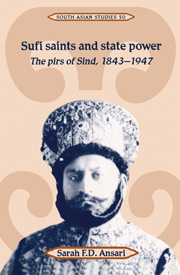Book contents
- Frontmatter
- Contents
- List of illustrations
- Acknowledgements
- A note on spelling
- List of abbreviations
- Glossary
- Introduction
- 1 Sind and its pirs up to 1843
- 2 Creating a system of political control after 1843
- 3 Challenge to the system: the Pir Pagaro and the Hur rebellion of the 1890s
- 4 Challenge to the system: the Khilafat movement, 1919–1924
- 5 A more complex system of political control: pirs and politics under the raj, 1900–1947
- 6 The final challenge: the Pir Pagaro again
- Epilogue
- Conclusion
- Select bibliography
- Index
- Cambridge South Asian Studies
2 - Creating a system of political control after 1843
Published online by Cambridge University Press: 01 October 2009
- Frontmatter
- Contents
- List of illustrations
- Acknowledgements
- A note on spelling
- List of abbreviations
- Glossary
- Introduction
- 1 Sind and its pirs up to 1843
- 2 Creating a system of political control after 1843
- 3 Challenge to the system: the Pir Pagaro and the Hur rebellion of the 1890s
- 4 Challenge to the system: the Khilafat movement, 1919–1924
- 5 A more complex system of political control: pirs and politics under the raj, 1900–1947
- 6 The final challenge: the Pir Pagaro again
- Epilogue
- Conclusion
- Select bibliography
- Index
- Cambridge South Asian Studies
Summary
The Commissioner has heard with much pleasure of the good service rendered by you in constantly supporting the Government. He presents you in darbar with this afrinama [sic] and trusts that you will continue to do good service in future whenever it may be required of you.
The British shattered Sind's relative isolation when they conquered the province using force in 1843. Just as elsewhere in India, they required an alternative source of ‘legitimacy’ to convert military power into civil power, and so proceeded to introduce a system of political control based on the integration of indigenous powerholders into the framework of local authority. It was a system which deliberately protected and promoted the privileges of these élites in return for cooperation. The landed interests which many pirs had acquired by this time, together with their spiritual influence and consequent special hold over very large sections of Sindhi society, made them ideal candidates for inclusion. The conquest had threatened to undermine the fortunes of pir families by replacing the Muslim Talpur mirs with an infidel ruler who had little apparent interest in prayers being offered in its name or even the fear of Allah to encourage due respect. Instead, as members of the body of large landholders which formed the backbone of local society, many were drawn to and became beneficiaries of the British practice of distributing patronage based on the preservation of landed interests and the public bestowal of honour. But, although the authorities bestowed patronage, they could also withhold it as a means of exerting pressure or even punishment; and rewards had to be earned, usually through conspicuous acts of loyal assistance.
- Type
- Chapter
- Information
- Sufi Saints and State PowerThe Pirs of Sind, 1843–1947, pp. 36 - 56Publisher: Cambridge University PressPrint publication year: 1992



